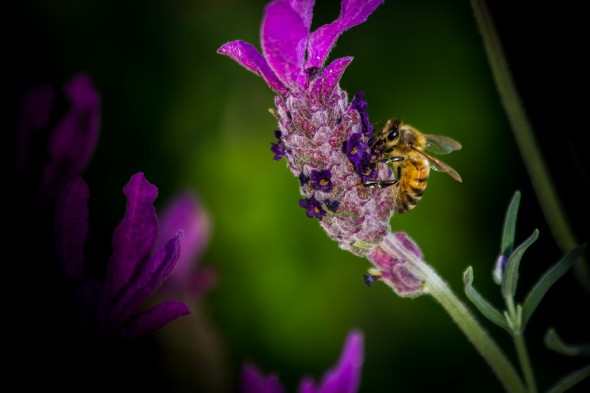TakePart | June 6, 2014
There’s finally some good news about the plight of the honeybees, which pollinate a third of our food but whose populations have been crashing over the past eight years.
Scientific studies have implicated a class of agricultural pesticides called neonicotinoids, or neonics, along with other factors such as poor nutrition. Now researchers in the United Kingdom have created a nontoxic biopesticide made from spider venom and a plant protein. The substance, called Hv1a/GNA, is experimental, and its effectiveness in killing agricultural pests remains unproved. But it’s one indication that biopesticides could one day serve as an alternative to bee-killing chemicals.
“Our findings suggest that Hv1a/GNA is unlikely to cause any detrimental effects on honeybees,” said Newcastle University professor Angharad Gatehouse about the biopesticide, which combines an Australian funnel-web spider’s venom and snowdrop lectin protein, which is found in potatoes, rice, and other plants.
In the study, published this week in Proceedings B, the Royal Society’s biology research journal, the scientists found that the survival of honeybees exposed to a variety of doses of the biopesticide for more than a week was only “slightly” affected. The biopesticide also had no measurable impact on their learning and memory. That’s important because bees memorize the route to a food source and communicate it to the hive.
Lead study author Erich Nakasu believes that because the honeybees’ learning and memory capacity did not change, the biopesticide does not interact with the insects’ calcium channels, which are linked to those characteristics.
Hv1a/GNA has to be ingested by the honeybees, such as when they eat pollen, to have any effect, and thus it cannot be absorbed via routine body contact with plants during pollination, he added.
Researchers said that it also did not affect the larvae, as the developing honeybees were able to break down the biopesticide in their guts.
In addition to U.S. agriculture—which is a big consumer of neonicotinoid pesticides, especially for genetically modified corn—the research has implications for Canada, another large pesticide user. Citing high risks for honeybees, the European Union last year imposed a two-year ban on the use of three types of neonicotinoids—clothianidin, imidacloprid, and thiamethoxam.
Yet despite Hv1a/GNA’s potential as an alternative, Gatehouse warns that a range of strategies must be used to keep bees alive.
“There isn’t going to be one silver bullet,” she said. “What we need is an integrated pest management strategy, and insect-specific pesticides will be just one part of that.”
View the original story here.
